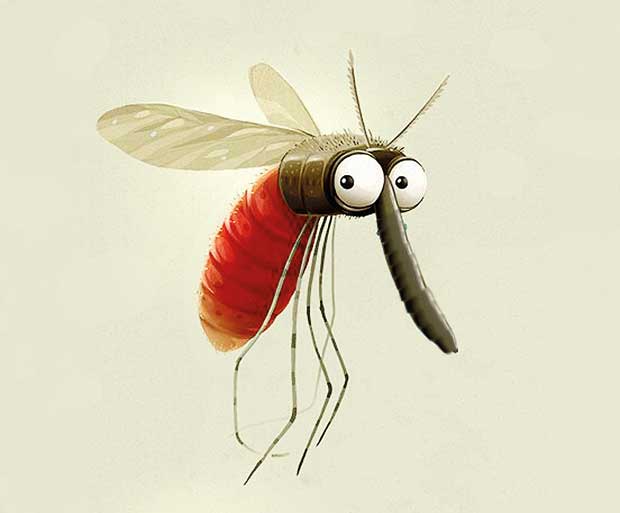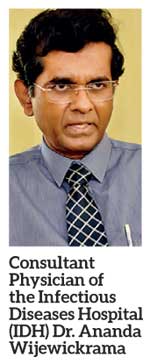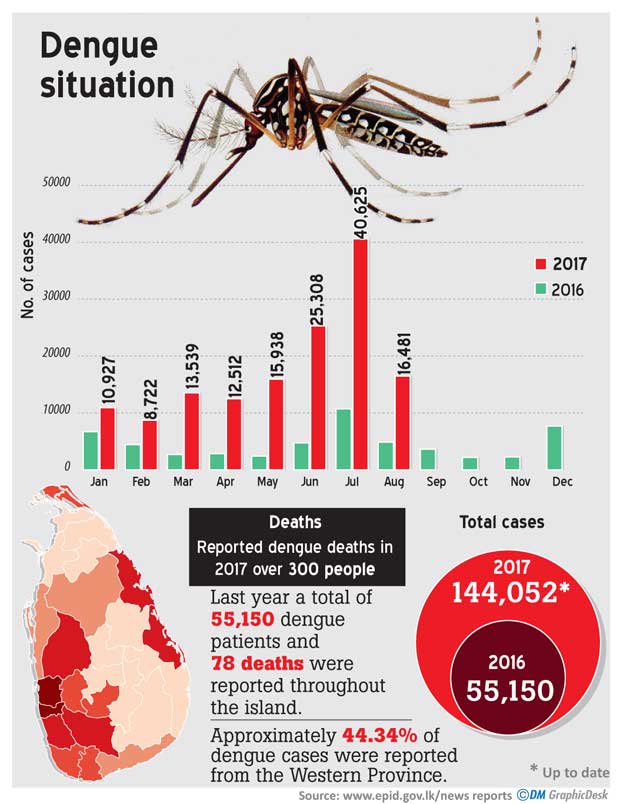Reply To:
Name - Reply Comment
Last Updated : 2024-04-20 20:10:00

It wasn’t long ago that many hospitals witnessed a difficult situation when they tried to accommodate the increasing number of dengue patients in hospital wards, that were already crowded beyond capacity. As the situation worsened with the increasing number of dengue patients admitted for treatment, many hospitals were compelled to make arrangements for temporary wards that could accommodate more patients. According to statistics at the Epidemiology Unit, a staggering 40, 625 dengue cases were recorded for the month of July alone, which is also the highest record for this year. It should also be noted that 144, 052 dengue cases have been reported since January this year.
accommodate more patients. According to statistics at the Epidemiology Unit, a staggering 40, 625 dengue cases were recorded for the month of July alone, which is also the highest record for this year. It should also be noted that 144, 052 dengue cases have been reported since January this year.
However, health officials who spoke to The Daily Mirror commented that they have observed an improvement in this trend since the number of dengue patients being admitted to hospitals have reduced significantly. The number of patients has dropped to 16, 481 in the month of August.
"There are two types of mosquitoes that transmit the dengue virus, namely Aedes aegypti and Aedes albopictus"
 Speaking to the Daily Mirror, Assistant Secretary of the Government Medical Officers Association (GMOA) Dr. Haritha Aluthge noted that the dengue epidemic is currently subsiding countrywide. He said that as far as the hospital set up is concerned, most of the wards, which were temporarily set up, are now being closed. Therefore, he said that the dengue situation is comparatively getting less challenging than earlier. However, he warned that the latest outcome, with regard to dengue, shouldn’t be taken for granted. He explained that this is mainly because the next peak season regarding dengue would commence in December with the onset of the monsoon rains. Therefore, he said that the cleaning up operations need to be continued with as usual and done
Speaking to the Daily Mirror, Assistant Secretary of the Government Medical Officers Association (GMOA) Dr. Haritha Aluthge noted that the dengue epidemic is currently subsiding countrywide. He said that as far as the hospital set up is concerned, most of the wards, which were temporarily set up, are now being closed. Therefore, he said that the dengue situation is comparatively getting less challenging than earlier. However, he warned that the latest outcome, with regard to dengue, shouldn’t be taken for granted. He explained that this is mainly because the next peak season regarding dengue would commence in December with the onset of the monsoon rains. Therefore, he said that the cleaning up operations need to be continued with as usual and done
more rigorously.
“The Ministry of Health needs to be alerted, so that it can continue with the cleaning up operations and the preventive measures against dengue. What really happens is that the authorities take preventive measures against curbing dengue only when the epidemic is increasing. It’s important to continue with these measures routinely until dengue starts peaking in December /January. If not so, we will experience a similar situation where an increased number of dengue cases will be reported again.
Currently, the cases being reported are clearly reducing, especially in Colombo and Gampaha where a high number of dengue cases were reported. Even the wards at the National Hospital were closed down following the decrease in the number of patients. This also includes the Infectious Diseases Hospital and other peripheral stations where the temporary wards have been closed down. However, it’s crucial to carry on with the preventive measure without failure in order to keep the epidemic at bay,” Dr. Aluthge added.
"We have identified high risk Grama Niladhari (GN) locations within the MoH areas"

According to the Consultant Community Physician attached to the National Dengue Control Unit Dr. Prachila Samaraweera, currently there is a significant reduction in the number of patients being reported on, with cases dropping to sixty percent. “We have still identified fourteen high risk districts which include, Colombo, Gampaha, Kalutara, Galle, Matara, Ratnapura, Kegalle, Kandy, Matale, Jaffna, Trincomalee, Batticaloa, Vavuniya and Kalmunai. With the onset of the North East monsoon, the Northern and East Provinces will be faced with the high risk of spreading dengue. We have declared the second, National Mosquito Prevention Week from September 20 – 26 covering all MoH areas of the country. We have identified high risk Grama Niladhari (GN) locations within the MoH areas. We are planning to cover all premises that fall within the purview of these GN Divisions. Routine inspection, identification and removal of dengue mosquito breeding grounds, pest control, health education and taking legal action against those who don’t maintain their surrounding environments clean will be the focus during this programme,”
Dr. Samaraweera said.
Accordingly, she said that the Presidential Task Force, including all the ministries that fall under its purview, Public Health Inspectors, the Tri Forces, the Police, local authorities, the Ministry of Health and the public, together will have to cooperate and work together in order to make the National Mosquito Prevention Week a success. While acknowledging that the number of patients in hospitals is reducing, she also noted that the current weather pattern and the garbage collection procedures practiced at present have contributed to this, to a certain extent. “We should bear in mind that there could be an outbreak anytime. Therefore, we can’t stop the activities we have commenced. Activities such as garbage segregation and proper disposal and the cleaning of the surrounding environment shouldn’t be stopped simply because the case load is decreasing,” Dr. Samaraweera said. She said that in the recent past, the public and the media had extended support to help control the outbreak. She emphasized on the need to keep up with the good work in future as well.
"We have declared the second, National Mosquito Prevention Week from September 20 – 26 covering all MoH areas of the country"
 Source reduction; the ultimate goal of removing mosquito breeding sites
Source reduction; the ultimate goal of removing mosquito breeding sites
When inquired about the current situation of the hospital, which was full of dengue patients, Consultant Physician of the Infectious Diseases Hospital (IDH) Dr. Ananda Wijewickrama said that the number of cases has reduced significantly. He stated that this is the result of the combination of efforts put together by the Ministry of Health with the involvement of all media groups, Government and Non-Government organizations and the general public. However, Dr. Wijewickrama said that people shouldn’t be complacent regarding this situation because after the October monsoon, a rise in the number of dengue cases is expected. “Unless we carry on these preventive programmes and continuously stress on the need to do so, a situation similar to what happened in June and July could repeat in December. If we continue to focus on source reduction, especially on the removal of mosquito breeding sites, we can reduce the risk of dengue spreading to a great extent. There are two types of mosquitoes that transmit the dengue virus, namely Aedes aegypti and Aedes albopictus.
Since mosquito breeding sites increased alarmingly this time, the number of mosquito larvae found in many places also increased rapidly. This situation was mostly witnessed inside houses. The most prevalent mosquito type during the last few months was the Aedes aegypti which is a household mosquito that breeds around or inside residences. That is why we receive many cases where patients are from the same family. Therefore, it is a public responsibility to keep their houses devoid of mosquito breeding sites. Keeping the surrounding environment clean should also be done as a regular habit rather than doing it as a preventive measure when there is an outbreak,” Dr. Wijewickrama concluded.
"According to statistics at the Epidemiology Unit, a staggering 40, 625 dengue cases were recorded for the month of July alone, which is also the highest record for this year"


Add comment
Comments will be edited (grammar, spelling and slang) and authorized at the discretion of Daily Mirror online. The website also has the right not to publish selected comments.
Reply To:
Name - Reply Comment
On March 26, a couple arriving from Thailand was arrested with 88 live animal
According to villagers from Naula-Moragolla out of 105 families 80 can afford
Is the situation in Sri Lanka so grim that locals harbour hope that they coul
A recent post on social media revealed that three purple-faced langurs near t